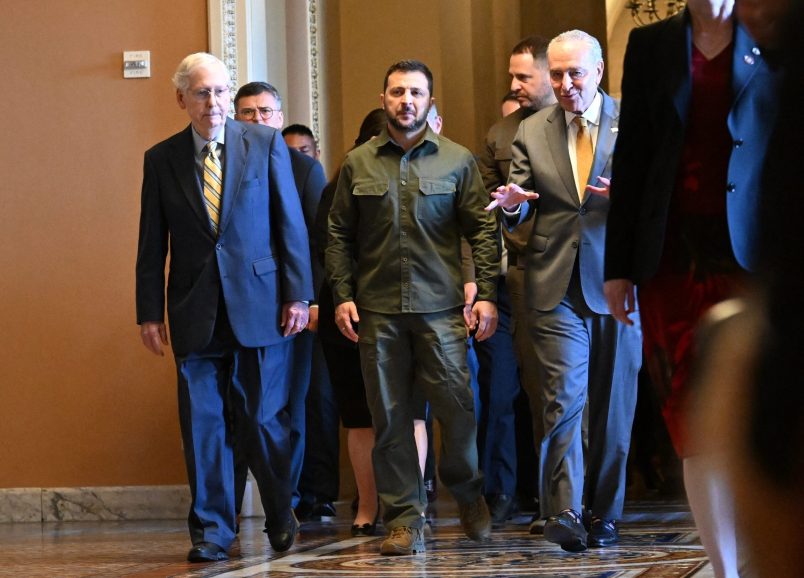Chaos inflicted on the House over the past several weeks by a small cohort of MAGA Republicans may claim one main victim besides Kevin McCarthy’s dignity: aid to Ukraine.
The fate of a $24 billion support package to Kyiv was imperiled after it was left out of the continuing resolution to keep the government open, which passed the House with Democratic support on Saturday — a move that ultimately led to McCarthy’s ousting. But the perception of Ukraine on the far-right has also played a role, with the same members of Congress who helped sink the package — and even some who nominally support it — having spent months portraying the embattled country as a weak supplicant to forever declining American wealth.
“You have a perfect storm building and it’s not a good perfect storm,” Aaron David Miller, senior fellow at the Carnegie Endowment for International Peace and a longtime adviser to secretaries of state for both parties, told TPM. Miller pointed to a growing resignation to the how long the war will last, Russia showing no willingness to negotiate, and faltering U.S. support as potentially disastrous for Ukraine.
Further aid to Ukraine continues to enjoy majority support, both in public polling and in both parties in Congress. But hostage-taking in the House over aid to Kyiv found success in recent weeks as isolationist members of Congress, largely coalescing around Rep. Matt Gaetz (R-FL), spent months casting Ukraine as undeserving of a shrinking pool of American largesse, denied to American citizens while lavished on Kyiv.
That narrative is true in one limited sense: Ukraine is the weaker side in the war.
With its smaller population and war-wrecked economy, Ukraine has been the underdog in the fight since Russia launched its full-scale invasion in February 2022, despite the flow of massive aid from the west.
That David and Goliath perception has buttressed both public support for Kyiv and how the government of Volodymyr Zelensky has sought to portray itself abroad.
“Being David is having a sling to win,” Zelensky said in a February 2023 video recorded for the Munich Security Conference, where he pleaded for more weapons. “We do not yet have the sling.”
On the far-right, that underdog status has often translated into perceived weakness.
When Zelensky visited Washington in December 2022 to deliver an address to a joint session of Congress in which he pleaded for more aid, Donald Trump Jr. called him an “ungrateful international welfare queen.”
Others have joined in similar forms of rhetoric.
McCarthy, back in October 2022, tried to walk the line by saying that a “blank check” wouldn’t cut it, in part, because of U.S. economic issues.
“I think people are gonna be sitting in a recession and they’re not going to write a blank check to Ukraine. They just won’t do it,” he said in the weeks leading up to the midterms.
Gaetz, who took down McCarthy this week and has emerged as a leading figure in procedural efforts to force through cuts to Ukraine aid, introduced a resolution in February 2023 seeking to end support for the county.
“America is in a state of managed decline, and it will exacerbate if we continue to hemorrhage taxpayer dollars toward a foreign war,” he said.
It also plays into residual resentment about lack of government funding for social services at home. The budgets are different, but right-wing politicians who oppose Ukraine aid have sought to suggest that it’s a zero sum game, that money which could go to the U.S. is instead being spent abroad.
This emerged starkly when Biden traveled to Kyiv in February. The East Palestine, Ohio train disaster occurred at the same time.
“This is incredibly insulting,” Rep. Marjorie Taylor Greene (R-GA) wrote. “Today on our President’s Day, Joe Biden, the President of the United States chose Ukraine over America, while forcing the American people to pay for Ukraine’s government and war.”
One House GOP aide told TPM that the aim was, in part, to portray Ukraine support as cutting into the needs of Americans.
There’s also the personal factor: animus driven by Donald Trump, who has regarded the downfall of his 2016 campaign chairman Paul Manafort and subsequent accusations of Russian meddling as the product of byzantine conspiracies orchestrated by the Ukrainian government. That paranoia led him to dispatch his attorney Rudy Giuliani to Kyiv to push the government to manufacture dirt on the Biden family in exchange for weapons deliveries; the effort resulted in his first impeachment.
Apart from creating a level of paranoia in Kyiv about U.S. politics, that episode also stoked suspicion of Ukraine within the Republican Party as a potentially hostile domestic political actor.
Trump himself refused to say during a CNN town hall this summer whether he would support further aid to Ukraine, repeating only his dubious (and disconcerting) line that he’d end the war “in 24 hours.”
“This is about getting even,” Miller, the Carnegie Endowment fellow, told TPM. “And I think our allies are right to be worried, and the adversaries are quite right to be delighted, particularly Putin.”
To be clear, Congress could still find a way to pass more aid to Kyiv. It’s a separate question whether the current haggling reduces that amount, hampers ongoing supply efforts, or delays supplies until a new package is passed.
As Ukrainians see it, they’re still the ones paying the highest price: blood.
“We’re in an interesting position,” one prominent Kyiv journalist wrote to TPM this week. “We can be humiliated and insulted when it’s worth it to someone. And we can be helped, also when it’s worth it to someone.”



